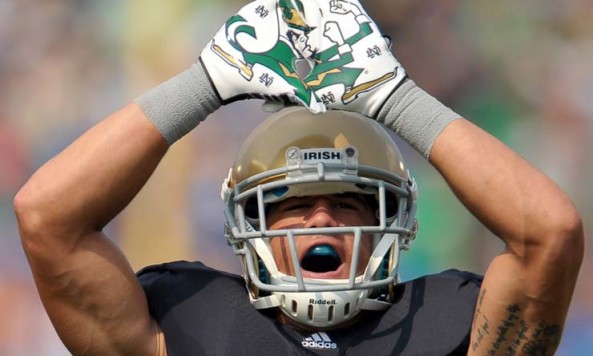Bennett Jackson and KeiVarae Russell will be making their first starts at cornerback on Saturday. While Irish fans can take some comfort in the fact that neither corner will be facing Robert Woods, defending Navy's flexbone offense requires sound play from the secondary. One of the ways I expect Bob Diaco to take pressure off of his inexperienced corners is to play a fair amount of Cover 3 and Cover 4 behind Notre Dame's 4-3 defense.
When defending the flexbone,a cornerback's primary responsibility in Cover 3 and Cover 4 is man coverage on the wide receiver lined up across from him. His job is to follow that receiver unless the receiver stays shallow or slants in to block the safety. If the receiver blocks the play side safety, the cornerback becomes the force player, i.e., the player responsible for containing the pitchman. The beauty of these coverages is that the cornerback only has to read his receiver. Because his primary responsibility is pass coverage, he is less susceptible to the inevitable play-action pass. And, more often than not, the cornerback will not need to make the tackle.
Notre Dame had some success against Navy last season running Cover 3 and Cover 4 behind the front 7. Let's look at a few examples.
Navy lines up in a standard flexbone formation with a receiver split wide to either side. Notre Dame counters with a 4-3 look. Both Blanton and Gray give generous cushions to the receivers.
Trey Miller fakes the hand-off to the fullback and drops back to pass. Harrison Smith, who is presumably the force player, is momentarily fooled by the play-fake. Notice how Blanton and Gray never break on the play-fake and stay focused on their receivers.
Miller has no chance of hitting a deep pass on this play with Blanton and Gray maintaining over-the-top leverage.
The coverage forces Miller to scramble as the pocket collapses. He ends up smothered in Irish Chocolate. Navy's failed attempt to hit the vertical pass leaves the Midshipmen with a 3rd and long.
The next play illustrates why Cover 4 rarely requires much run support from the cornerback.
Navy lines up in the flexbone with the receivers split about as wide as possible. Once again, the Irish defense is in the 4-3 with loose coverage on the corners.
The defensive line takes away the fullback while Manti Te'o and Dan Fox shuffle to the play side. Zeke Motta begins his pursuit from the strong safety spot. Gray simply maintains deep leverage on the receiver running down the sideline.
 Te'o penetrates and forces the pitch. Although the safety is typically the force player in quarters coverage, Fox plays contain on this play as the slotback slides past him to block Motta.
Te'o penetrates and forces the pitch. Although the safety is typically the force player in quarters coverage, Fox plays contain on this play as the slotback slides past him to block Motta.
Fox makes the play behind the line and gets Navy "off schedule."
This play illustrates something that I found interesting while re-watching the game. Navy consistently had slotbacks bypassing the Notre Dame defensive ends to arc release and block the Irish safeties. Perhaps Navy thought that Notre Dame would use the safety as the force player for the majority of the game like it had against Army and Air Force. In any event, Navy's perimeter blocking did little to hold the Irish in check.
If Navy is going to attack the perimeter and test Jackson and Russell in the run game, I would expect the receivers to "crack" block the Irish safeties and outside linebackers every so often.
The goal of the crack block is to make the corner act as the force player or, at the very least, create some doubt between the safety and corner as to the proper assignment. This blocking scheme also sets up the wheel route by the slotback. Navy barely missed a touchdown last year on a wheel route so Notre Dame better be prepared this year.
Conclusion
Although Navy will inevitably take a few shots down the field on Saturday, my bigger concern is whether Jackson and Russell can be effective defending the perimeter against the run. No matter how much the defensive scheme is designed to protect these inexperienced corners, they will have make plays during the game when called upon. Based on Jackson's special teams performances, I think he'll be disciplined enough to be the force player and provide adequate run support. However, I'm not sure what to expect from Russell in his first collegiate game.































